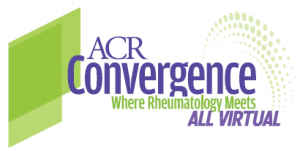 ACR CONVERGENCE 2020—Maria Laura Bertolaccini, PhD, postdoctoral research associate, King’s College London, started off the session on antiphospholipid syndrome (APS) talking about novel and non-criteria antibodies for APS and their potential to predict thrombotic episodes. Currently, three antibody tests are required for the diagnosis and classification of APS: lupus anticoagulant, anti-cardiolipin and anti-β2 glycoprotein I (anti-β2GPI). These three, although widely available, are not sufficient to identify all patients with APS. In searching for new diagnostic antibodies, researchers have found that IgG antibodies that recognize epitope Gly40-Arg43 in domain I of β2-gycoprotein I not only cause lupus anticoagulant, but their presence correlates strongly with thrombosis. This area of domain I is likely also covered by a carbohydrate chain in solution, making the epitope cryptic.
ACR CONVERGENCE 2020—Maria Laura Bertolaccini, PhD, postdoctoral research associate, King’s College London, started off the session on antiphospholipid syndrome (APS) talking about novel and non-criteria antibodies for APS and their potential to predict thrombotic episodes. Currently, three antibody tests are required for the diagnosis and classification of APS: lupus anticoagulant, anti-cardiolipin and anti-β2 glycoprotein I (anti-β2GPI). These three, although widely available, are not sufficient to identify all patients with APS. In searching for new diagnostic antibodies, researchers have found that IgG antibodies that recognize epitope Gly40-Arg43 in domain I of β2-gycoprotein I not only cause lupus anticoagulant, but their presence correlates strongly with thrombosis. This area of domain I is likely also covered by a carbohydrate chain in solution, making the epitope cryptic.
Antibodies for APS
A 2006 study found that pathogenic anti-β2-glycoprotein antibodies recognize domain I of β2 glycoprotein only after a conformational change.1 The anti-β2-GPI antibodies thus bind an epitope that is only exposed on β2-GPI when bound to a negatively charged surface. These antibodies to domain I of β2 glycoprotein (anti-DI) have been shown to increase the hazard ratio for APS and to be associated with thrombosis and pregnancy morbidity. Additional studies in animal models suggest these anti-DI antibodies are pathogenic. Nevertheless, because they are more specific but less sensitive than anti-β2GPI, their presence does not increase the diagnostic yield and their routine clinical use is still debated.
Data on antibodies to other domains of β2GPI were also presented.
Dr. Bertolaccini discussed antibodies to domain IV/V of β2GPI and explained that available data show these antibodies fail to induce thrombosis in a rat model. That said, preliminary evidence suggests that the anti-DI to anti-D IV/V ratio may be a useful new biomarker for APS that is helpful for identifying pathogenic anti-β2GPI.
A lot of interest has been directed to antiphosphatidylserine/prothrombin antibodies (aPS/PT). Animal models have revealed aPS/PT antibodies to be pathogenic and an independent risk factor for thrombosis. The antibodies are independent of the presence of lupus anticoagulant and their risk is additive to other routine antiphospholipid antibodies. Dr. Bertolaccini explained that, along with lupus anticoagulant and anti-β2 glycoprotein I, aPS/PT offer the best diagnostic accuracy for APS and they may be useful in identifying additional patients with APS.
Treatment of Thrombotic APS
Thomas Ortel, MD, PhD, chief of the Division of Hematology in the Department of Medicine at Duke University Medical Center, Durham, N.C., then presented his current recommendations for the treatment of thrombotic APS, as well as evidence against the use of direct oral anticoagulants. He highlighted three key references that addressed the treatment of thrombotic APS.

